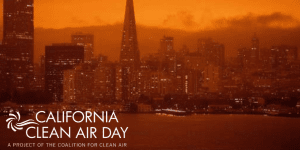We’ve seen the images. The entire Bay Area sky is a weird orange. Los Angeles sits under a dark cloud of smoke. In a record wildfire season, air quality has been poor in even the most pristine locations. So what do you do?
Short of providing actual medical advice, here are some simple steps to help you take control of the situation.
- Use California Clean Air Day and the clean air pledge as a way to talk to your family, friends, employees, customers, stakeholders or residents about air pollution. Local elected officials should also consider taking part in our City Leader’s Challenge.
- Check air quality near you on our website and AirNow.Gov. Follow your local air district on social media for smoke advisories.
- Shelter-In-Place. Close windows and doors. Run your A/C on recirculate with a new filter or if you have a removable filter, be sure it is clean. If you are using an air filter, make sure it is CARB certified.
- If you have to drive, replace the air filter in your car. It is easier than you think.
- If you have to, wear a mask at home.
- If you have to clean, use greener solutions.
- Don’t drive if you don’t have to and if you do and please avoid idling your engine.
- Follow the most recent CDC guidance regarding masks.
What about when air quality begins to improve?* Lets work together to reduce air pollution through these simple actions:
- Buy local. On average, our food traveled 1,500 miles to make it to the grocery store and our freight system to get it there is a huge contributor to local air pollution.
- Replace one car trip per week with a bike trip to the store.
- Consider responsible, socially-distant public transit as an option.
- Take your lunch to work rather than driving.
What about long-term improvements?
- Switch your lawn mower to electric or hand-powered.
- Drive electric! Thanks to California’s renewable portfolio standard, our electricity is getting “greener” every day. When combined with electric vehicle, its a powerful combination to improve air quality. Encourage your kids to take the clean air pledge!
- Engage the next generation. Get your kids to take the kids clean air pledge!
- Plant a tree. An incredible 1.6 million trees have been lost due to wildfires this year. The best time to plant a tree was yesterday. The second best is right now.
- Become a citizen advocate! Sign up for our legislative alerts and tell your policy-makers you want clean air today.
- *This is a relative Statement. California Cities suffer from some of the worst air pollution in the country even in normal times, resulting in some very real health consequences.
- Air pollution disproportionately effects youth and older Americans. So, I think these are the times when we really have to be good citizens. Check on your neighbors to make sure they are getting what they need as they shelter in place.
From health experts
If your heart or lungs are compromised, you are more sensitive to air pollution and infection. So please remember to take your medication. And for parents, remember that we can remain active by playing sports in the house. You really don’t need to go outside to exercise.
Afif El-Hasan, Pediatrician, Spokesperson for the American Lung Association
Air pollution can have life-long effects on our respiratory health, so it’s important to be aware of options to reduce exposure whenever possible. In the current wildfires-and-smoke events, physical safety is always the most immediate concern – follow public officials’ guidance, and evacuate if necessary. Secondly, doing what you can to reduce both short-term and long-term exposure to smoke and air pollution is always worth doing.
Reduce your level of activity during heat, pollution, and smoke conditions. Stay indoors with windows and doors closed. Wear a mask or personal protective device if available. If available, consider using the house AC or home air purifier to help clean the indoor air. Use a damp towel to seal off the air leaks from coming under the door. Drink plenty of water to keep hydrated and to avoid throat irritation.
Ed Avol, Professor and Chief, Environmental Health Division Department of Preventive Medicine, Keck School of Medicine at USC
From our experts
“People can try to deny climate change but now they are seeing it in front of their eyes and breathing the effects of climate change…preliminary studies show breathing particulate pollution from wildfires can make people more vulnerable to being infected by the coronavirus, and those who are infected can have more adverse health effects”
Bill Magavern, Policy Director, Coalition for Clean Air








